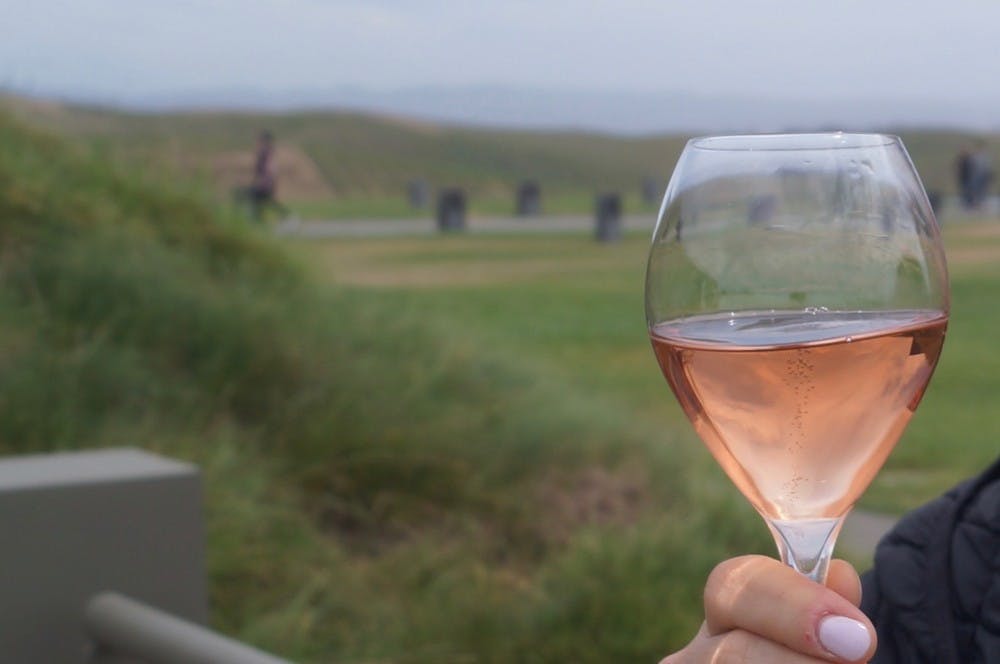While deadly wildfires rage in California and Hurricane Maria’s true death toll remains unknown, Central Virginia may seem far removed from the devastating impacts of climate change. Although the state has generally been insulated from highly publicized extreme weather events, small climatic shifts are creating significant problems for Virginia’s large agriculture industry. Vineyards, close to the hearts of many in Charlottesville, have been feeling the effects of climate change quite acutely this year.
“Anybody that grows anything is concerned about climate change, in a way that people that might be further removed from agriculture aren't,” said Matthew Brown, the wine club manager for King Family Vineyards and a University alumnus.
Because crop success depends so heavily on on the weather, growers are paying particularly close attention to even the slightest changes and developing techniques to cope.
According to Deborah Lawrence — an environmental science professor who specializes in climate change — average temperatures in Virginia are increasing. Warmer weather leads to more pests, more disease and more ripening, which is particularly relevant for vineyards. Ripening produces the sugar within grapes, which goes on to produce the alcohol found in wine. More ripening means more sugar and more alcohol in the final product.
One innovative way to help slow the ripening process is by using a product called Surround, a white sprayable clay that farmers can apply to their crops to help reflect UV light, keeping them cooler and preventing precocious ripening. However, that is not the only benefit the spray offers. Derived from a natural mineral, the clay is extremely sharp on a microscopic level. While it is harmless to humans, it effectively repels many of the bugs and pests that become more prolific in a warmer climate.
While temperatures are trending upwards, short-term concerns for Virginia's agriculture have more to do with colder springs and heavy rain. One result of climate change unique to the Southeast are polar vortices — created by changing conditions at the poles affecting the jet stream — that blast cold air into the region during the winter and spring. The spring months, when the grapes have just started to bud, are when the plants are at their most sensitive. One harsh frost could mean the loss of the entire year’s crop.
King Family Vineyards has taken several steps to try to prevent this. During cold spring nights, warmer air rises creating what’s known as the inversion layer. The winery has installed a wind machine, and will sometimes even fly helicopters over the vineyard, in order to force this warmer air down among the vines. On particularly cold nights, they resort to burning bales of hay near the plants.
The major challenge facing viticulturists right now though is the rain. 2018 has been the wettest year on record to-date for Washington, D.C. and Roanoke, and the second wettest year for Richmond. All of that water is creating serious consequences for crop producers.
Lawrence said that heavy spring flooding can wipe out immature sprouts, and more moisture means increased chances of mold and mildew. To reduce foliage, vineyards have to “manage the canopy,” which means hand-trimming leaves to make sure the plants have enough surface area for photosynthesis, but not so much to make them prone to fungal growth.
When the vines absorb more water, they also give more water to the grapes, which can dilute their flavor. In order to maintain high quality standards, King Family has had to concentrate their wines. While this preserves the desired flavor, color, aroma and tannin, up to 20 percent of the liquid initially produced is lost in the process. The financial impact of increased precipitation goes well beyond simply lost product though. Intensive canopy management necessitates increased labor costs, and rainy weekends have hurt agritourism in Virginia wine country.
To help allay the problems created by changing weather patterns, Glass House Winery, in Free Union, Va., has opted to focus on different varieties of wine that are less affected by the rain.
“My too-often-repeated 2018 joke,” Glass House Winery owner Jeff Sanders said. "When life gives you lemons, make lemonade. When it gives you this year's weather, make rosé."
Sanders said we “are not prescient enough” so know how exactly how climate change will impact wineries the the future. However, Brown described what can be expected from wine in different climates. Warmer weather will mean wines that have higher alcohol and sugar levels, depleting their structure and making them taste “jammy,” while places experiencing cooler conditions will produce higher acid wines, similar to champagne.
For Lawrence, the key is creativity.
“The innovators who discover which grapes are both tolerant of our extreme weather and delicious will be the ones that do well,” Lawrence said. “I would urge innovation and experimentation.”
Brown, who frequently interacts with winemakers from the around the world due to his studies at the Institute of Master of Wine based out of London, noted that climate change is playing an increasing role in discussions about wine. However, he feels that the United States is not on the same page.
“It does seem like we live in the only country in the world where it's an option to believe in climate change,” Brown said. “Which is just terribly tragic.”







